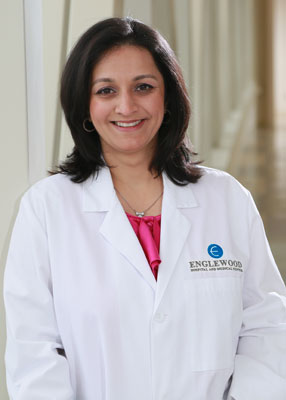
Minaxi Jhawer, MD, Chief of Hematology/Oncology
Personalized Medicine With Molecular Profiling
The oncology team at Englewood Hospital and Medical Center works across disciplines to create the optimal personalized care plan for its patients. Part of that plan involves a comprehensive understanding of the patient as a whole and a detailed study of the patient’s tumor biology in order to treat it appropriately.
“We’ve really come a long way in being able to use drugs that specifically target certain aspects of the cancer pathway that not only improve our cancer outcomes but also make therapies more tolerable for the patient,” said Minaxi Jhawer, MD, chief of hematology/oncology at Englewood Hospital.
A recent study presented at the 2016 annual meeting of the American Society of Clinical Oncology found that in patients with advanced colorectal cancer who express HER2, targeting the HER2 receptor with biologic drugs could shrink the tumor by 30% or more (abstract LBA11511). “It’s a small percentage of colorectal patients (<5%) who have HER2 overexpression,” Dr. Jhawer said. “But it does show that precision medicine is very effective in treating advanced-stage tumors.”
If a patient has advanced or stage IV cancer, the medical center’s oncology team studies the pathology sample in detail to understand the biology of the tumor and to identify different targets for drug therapy. A look at the microsatellite DNA recognizes instability and errors, as well as deficiencies in mismatch repair in tumor DNA. “After we take in the biological and molecular information, we can determine which patients will benefit from specific immunotherapies,” she said.
When a patient presents with colorectal cancer, Dr. Jhawer’s medical oncology team springs into action. Patients with stage II or some with stage III cancer receive an Oncotype (Genomic Health) test to pinpoint the genes at play, determine the likelihood of recurrence postsurgery, and determine whether they will need chemotherapy and radiation therapy. “If the Oncotype score is low, it informs us that the odds of recurrence are low and these patients will not benefit from chemotherapy, and if the oncotype score is high, they will likely have a higher risk of recurrence and hence will benefit from the chemotherapy regimen. This helps make a very personalized plan for all our patients,” Dr. Jhawer said.
As a medical oncologist, Dr. Jhawer works closely with the surgeons to form a treatment plan for the patient. “There’s a multidisciplinary team of several exceptionally qualified physicians who orchestrate and form a comprehensive cancer care plan for the patient,” she said. “We don’t just treat the cancer but the patient as a whole, and strive to improve the quality of life for all our patients.”
In addition to a medical oncologist and surgeon, a pain and palliative care physician, a geneticist, a nutritionist, an integrative medicine physician and possibly a radiation oncologist also see the patient. “The patient’s internist continues to be an integral part of this planning and process, which means the doctor that probably has the closest relationship with the patient and the patient’s family is absolutely part of the care team,” Dr. Jhawer said.
To help with the overall care of the patient, Dr. Jhawer initiated and spearheaded a free yoga program for all patients diagnosed with cancer, which is buttressed by research that shows yoga helps cancer patients improve their sleep and mood, and it combats pain and fatigue.
The patients are also taught about the anticancer benefits of mushrooms, turmeric and aspirin and instructed to take vitamin D, since low levels of vitamin D correlate with a high risk of return for cancer. “This is very different from hospitals that will shuttle patients from building to building to go from a surgeon to radiation oncologist. Here, we’re bringing all the physicians together to the patient and are treating not just the cancer but the whole person using all possible avenues of care.
“We really practice many different levels of personalized medicine,” Dr. Jhawer said, “and it leads to improved outcomes.”
Posted March 2017

Minaxi Jhawer, MD, Chief of Hematology/Oncology
